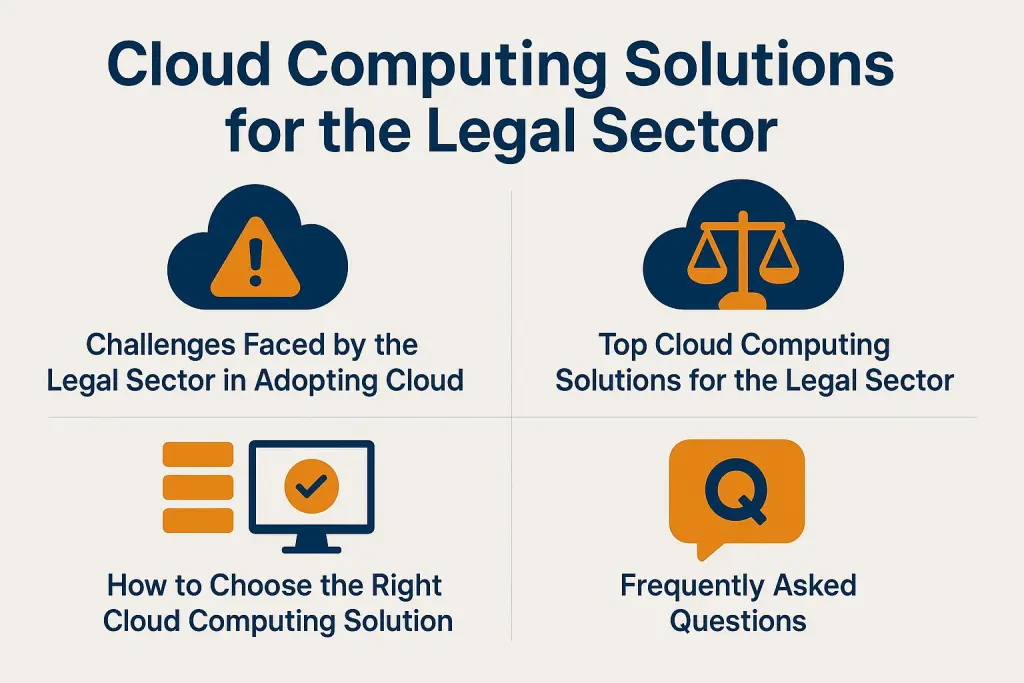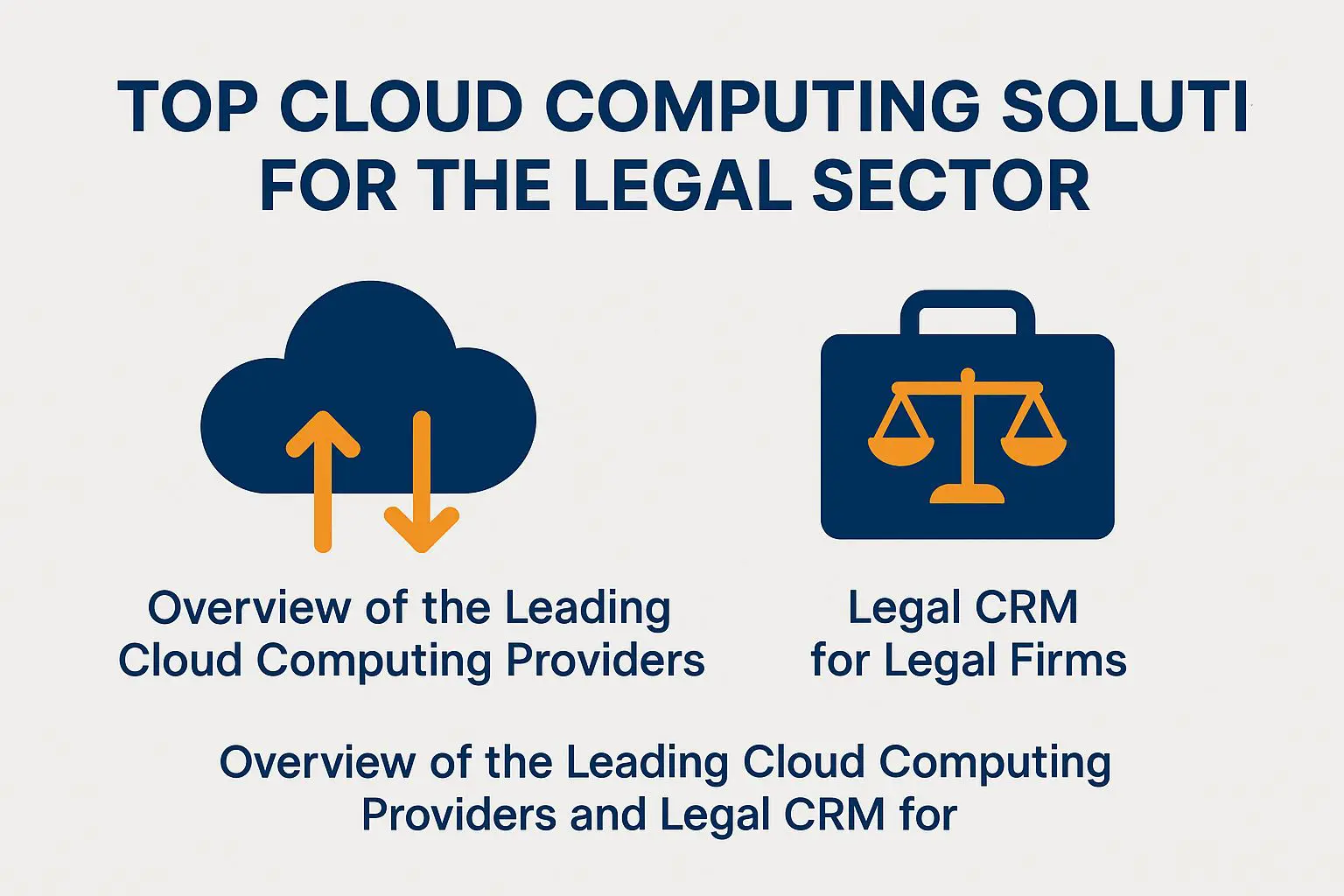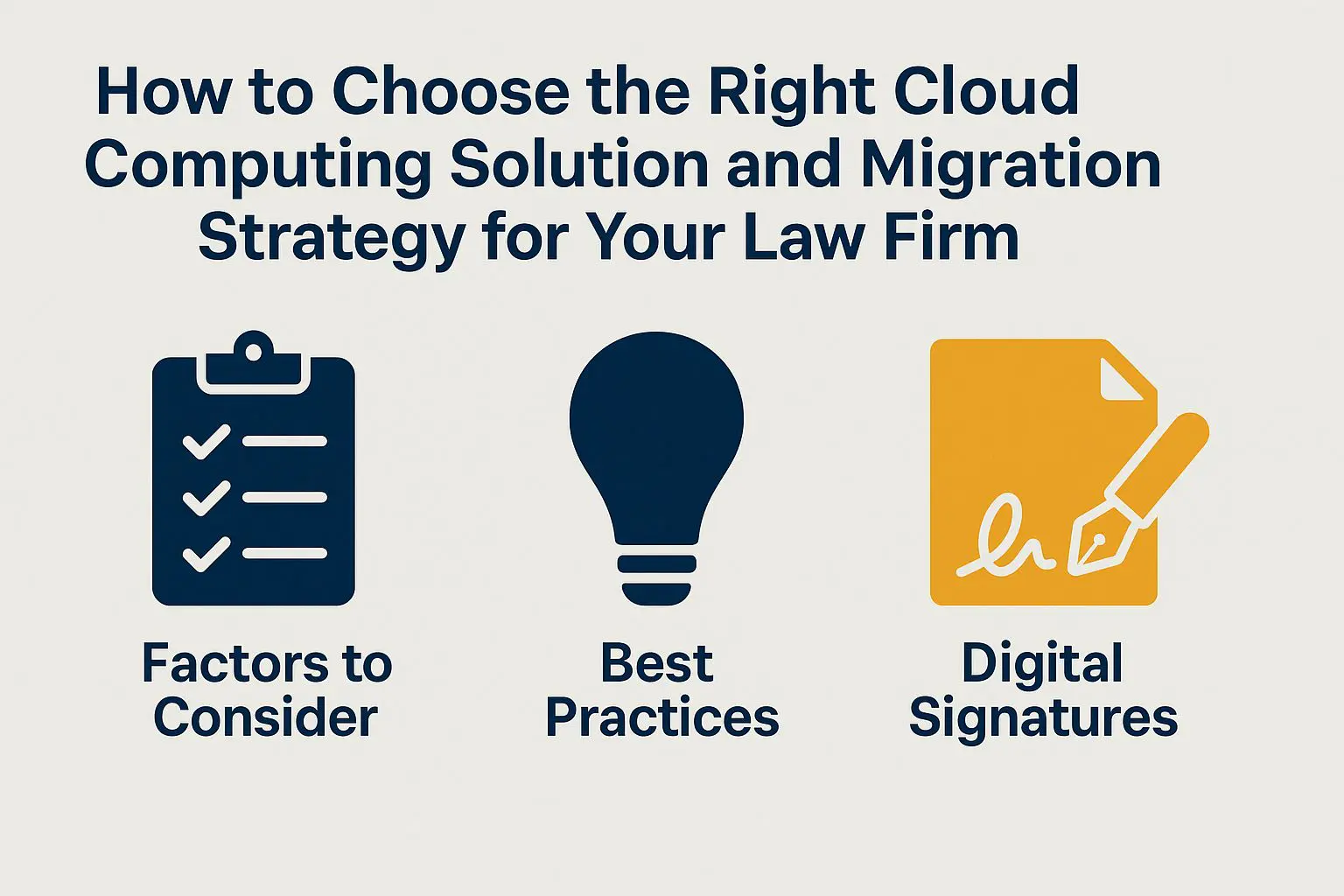Cloud Computing Solutions for the Legal Sector

Cloud computing helps law firms. It offers efficiency, flexibility, and better document management.
Law firms face hurdles when adopting cloud technology. This article explores the benefits that cloud computing brings to the legal industry, including legal software and cloud infrastructure, the challenges firms face during implementation, and the best compliance solutions available. It also provides essential guidance on how to select the right cloud computing solution tailored to the specific needs of a law firm.
By using this technology, firms can improve their practices. They can also enhance client service with better communication and collaboration tools.
Explanation of Cloud Computing and its Benefits for the Legal Industry, including SaaS, PaaS, and IaaS
Cloud computing is changing the legal sector. It offers many benefits and enhances the use of legal technology. By utilizing Software as a Service (SaaS) models, law firms are able to seamlessly access essential legal case management software and document management solutions, promote collaboration tools for remote access, and implement robust data security protocols to safeguard sensitive information, ensuring client confidentiality.
This shift to cloud-based solutions changes the industry significantly, facilitating improved practice management, legal innovation, and enhanced legal processes.
Cloud computing lets legal professionals work from anywhere. This removes geographical barriers and supports remote work.
Cloud solutions can significantly reduce costs by decreasing hardware and maintenance expenses, allowing for the reallocation of resources toward client relationship management, strategic growth, and improved law firm operations.
Enhanced data privacy features reassure clients that their information is secure. This builds trust and strengthens relationships, supported by cybersecurity and access control measures. Furthermore, by automating legal workflows through these technological advancements, firms can enhance efficiency, prioritize high-value tasks, provide exceptional service to their clients, and utilize legal document automation software.
Challenges Faced by the Legal Sector in Adopting Cloud Computing and Cloud Compliance
Despite its advantages, the legal sector faces challenges in using cloud computing. These challenges include data security, compliance management, and integration services. These are important for legal ethics and regulations.
Additionally, law firms must address barriers to technology adoption, particularly when implementing remote work solutions, virtual law offices, and mobile access that have the potential to enhance efficiency but also introduce operational risks.

Security Concerns, Regulatory Compliance, and Risk Management
Data protection and compliance are major issues for firms using cloud technology. With sensitive client information at risk, these firms must prioritize cybersecurity measures, secure communications, and ensure adherence to legal ethics and compliance standards. This involves integrating robust cloud compliance practices, cloud adoption strategy, and cloud storage that govern secure file sharing and information governance.
Legal professionals should use standard security protocols to manage risk and protect data. These include:
- Encryption
- Multi-factor authentication
- Regular audits
These measures secure communication channels and enhance client trust. Clients expect their data to be private and secure.
A detailed disaster recovery plan is essential. It helps mitigate data breaches and system failures. This plan should outline how to restore operations quickly, secure data integrity, and manage legal projects effectively. It ensures compliance with regulations and protects the firm’s reputation.
Top Cloud Computing Solutions for Law, Including AI
Cloud computing solutions for the legal sector have grown significantly. They provide tools like case management software, e-discovery, contract management, and legal research applications.
Partnering with leading cloud service providers ensures optimal performance and scalability.

Overview of Leading Cloud Providers and Legal CRM
Leading cloud computing providers offer a range of Software as a Service (SaaS) solutions for legal firms. These include secure communications and subscription models. They provide legal billing software and client portals, focusing on interoperability to streamline workflows.
These platforms use advanced technologies like AI applications and data analytics. This helps legal professionals specialize and deliver customized legal services.
Therefore, the adoption of these cloud solutions fosters operational agility and positions legal firms to proactively address the evolving needs of their clients.
Choosing the Right Cloud Computing Solution and Migration Strategy
Choosing the right cloud computing solution requires careful consideration of factors like vendor management and virtual legal assistants. These greatly influence efficiency.
Law firms must evaluate their specific needs concerning cloud scalability, performance metrics, and the capacity to integrate the chosen solution with their practice management requirements and electronic filing systems.
This assessment ensures that the selected cloud services adequately address both current and future demands.

Factors to Consider and Best Practices for Implementation
Law firms should consider key factors for success when implementing a cloud computing solution. Best practices include developing data migration strategies and ensuring technology integration.
The importance of comprehensive staff training cannot be overstated, as it equips employees with the necessary skills to navigate the new systems confidently. Ongoing IT support is also essential, as it ensures that any issues encountered during daily operations are promptly addressed, thereby minimizing disruptions.
Regular performance evaluations are critical. This includes assessments of cloud hosting and billing software. These evaluations check how well the solution meets the firm’s needs. They allow for adjustments, improving client relationship management and enhancing legal services.
Frequently Asked Questions
What are cloud computing solutions for the legal sector?
Cloud computing solutions for the legal sector use cloud technology to store, manage, and access legal data and documents. This allows law firms to access data and resources from any location with an internet connection. It is a convenient and efficient solution for the legal industry.
How can cloud computing solutions benefit the legal sector?
Cloud computing solutions offer many benefits for the legal sector. These include increased data security, better collaboration, and cost savings. They also allow easier access to resources and documents. This helps legal professionals work more efficiently.
Are cloud computing solutions secure for storing sensitive legal data?
Concerns about cloud computing security exist. However, many providers offer advanced security features and comply with industry regulations. Choose a reputable and secure cloud provider. Implement proper security measures in the law firm to protect sensitive legal data.
What types of cloud computing solutions are available for the legal sector?
Various types of cloud computing solutions exist for the legal sector. These include Software as a Service (SaaS), Platform as a Service (PaaS), and Infrastructure as a Service (IaaS). Each of these options offers different capabilities and benefits, and it is important to choose the one that best meets the specific needs of the law firm.
Can cloud computing solutions help with remote work for legal professionals?
Yes, cloud computing solutions can greatly aid in remote work for legal professionals. The ability to access documents and data from any location with an internet connection allows for increased flexibility and the ability to work remotely. This is particularly helpful in situations such as court hearings or travel for cases.
How can a law firm transition to using cloud computing solutions?
The transition to cloud computing solutions can vary for each law firm. It depends on the specific needs and resources of the firm. Carefully research and select a secure cloud service provider. They should offer IT support for legal tools. Develop a plan to migrate data, automate workflows, and train staff on the new system, including digital evidence management. Having a backup plan for data recovery and case tracking is also beneficial. This helps in case of any technical issues during the transition.




